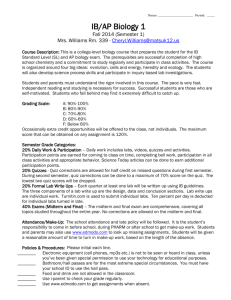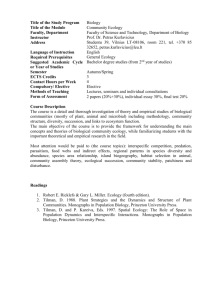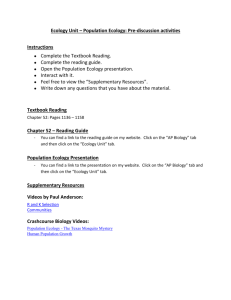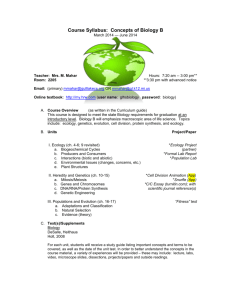Biology 131 - Ecology and Adaptation
advertisement
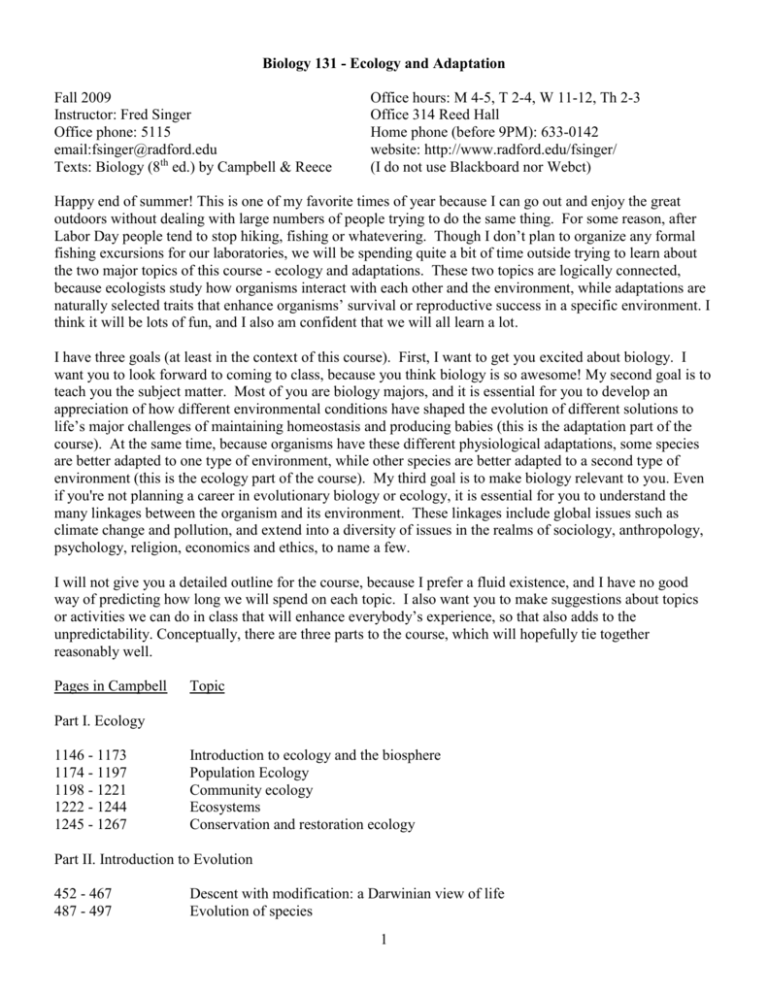
Biology 131 - Ecology and Adaptation Fall 2009 Instructor: Fred Singer Office phone: 5115 email:fsinger@radford.edu Texts: Biology (8th ed.) by Campbell & Reece Office hours: M 4-5, T 2-4, W 11-12, Th 2-3 Office 314 Reed Hall Home phone (before 9PM): 633-0142 website: http://www.radford.edu/fsinger/ (I do not use Blackboard nor Webct) Happy end of summer! This is one of my favorite times of year because I can go out and enjoy the great outdoors without dealing with large numbers of people trying to do the same thing. For some reason, after Labor Day people tend to stop hiking, fishing or whatevering. Though I don’t plan to organize any formal fishing excursions for our laboratories, we will be spending quite a bit of time outside trying to learn about the two major topics of this course - ecology and adaptations. These two topics are logically connected, because ecologists study how organisms interact with each other and the environment, while adaptations are naturally selected traits that enhance organisms’ survival or reproductive success in a specific environment. I think it will be lots of fun, and I also am confident that we will all learn a lot. I have three goals (at least in the context of this course). First, I want to get you excited about biology. I want you to look forward to coming to class, because you think biology is so awesome! My second goal is to teach you the subject matter. Most of you are biology majors, and it is essential for you to develop an appreciation of how different environmental conditions have shaped the evolution of different solutions to life’s major challenges of maintaining homeostasis and producing babies (this is the adaptation part of the course). At the same time, because organisms have these different physiological adaptations, some species are better adapted to one type of environment, while other species are better adapted to a second type of environment (this is the ecology part of the course). My third goal is to make biology relevant to you. Even if you're not planning a career in evolutionary biology or ecology, it is essential for you to understand the many linkages between the organism and its environment. These linkages include global issues such as climate change and pollution, and extend into a diversity of issues in the realms of sociology, anthropology, psychology, religion, economics and ethics, to name a few. I will not give you a detailed outline for the course, because I prefer a fluid existence, and I have no good way of predicting how long we will spend on each topic. I also want you to make suggestions about topics or activities we can do in class that will enhance everybody’s experience, so that also adds to the unpredictability. Conceptually, there are three parts to the course, which will hopefully tie together reasonably well. Pages in Campbell Topic Part I. Ecology 1146 - 1173 1174 - 1197 1198 - 1221 1222 - 1244 1245 - 1267 Introduction to ecology and the biosphere Population Ecology Community ecology Ecosystems Conservation and restoration ecology Part II. Introduction to Evolution 452 - 467 487 - 497 Descent with modification: a Darwinian view of life Evolution of species 1 Part III. Physiological and behavioral adaptations in plants and animals 764 - 784 785 - 800 852-874 875 - 897 898 - 929 1120 - 1145 Resource acquisition and transport in vascular plants Soil and plant nutrition Basic Principles of animal form and function Animal nutrition Circulation and gas exchange Animal behavior Outside readings - on electronic reserve at McConnell Library. Go to the Library website, and click on Course Reserves. Type in Singer, and then download the article. Panda's Thumb Devil’s Gardens Cold Blood: The Tale of the Icefish Heat reward for insect pollinators The flower of seduction Ivory-Bill Returns Ivory-billed Woodpecker (Campephilus principalis) Persists in Continental North America Comment on "Ivory-billed Woodpecker (Campephilus principalis) Persists in Continental North America" Response to Comment on "Ivory-billed Woodpecker (Campephilus principalis) Persists in Continental North America Gould, Steven Frederickson, Megan E. Carrol, Sean Seymour, Roger S. Ledford, Heidi Kennedy, Donald Fitzpatrick, John Sibley, David Fitzpatrick, John This is a fair amount of reading material, but reading is the primary way scientists learn. So hopefully you all enjoy reading, or are at least willing to do it. To help you with your reading I will assign homework questions, which will help you in several ways. Way # 1. I will assign homework every week that you should have completed by the lecture on Thursday morning. Bring your homework to class. You can use these questions as a guide to the reading in the chapter. I expect you will need to spend several hours to answer the homework questions well (you can answer them poorly in less than an hour, but that won't help you) because… Way # 2. Every Thursday morning (with the exception of the first Thursday, and weeks that have exams), you will be greeted with a quiz. The quiz will be based on your homework questions, the readings, and on the lecture material that we've covered since the last quiz or exam. I will sometimes not cover the homework material in class, so you (in those cases) will have to do some learning on your own. Of course you are always encouraged to ask me questions in class and/or in my office about material that you are having difficulty with (or that you want to know more about). The quiz will be open-notes, so you will be way ahead of the game if you come to all the lectures, and bring your homework with you to class on Thursday. I will drop the two lowest quiz scores. If you're sick for a quiz, I will excuse you if you present me with a 2 Dr.'s note confirming your illness (otherwise, you can drop that quiz score). If you’re on a sports team that has an away game, I will excuse you for the quiz so long as you let me know (email is fine) before the quiz. If you have an appointment with your academic advisor, or if you need to register for classes, please change your appointment. If you leave class in the middle of a quiz day, I will place your quiz into the recycling bin without even looking at it. Way # 3. For each exam (there will be 3 of them), you will be allowed to bring in a full-sized piece of paper to keep you company on the exam. On that paper, you may write anything you'd like. The paper must be prepared by you and handwritten (i.e. you can't give your piece of paper to someone else, and you can't make two copies of your piece of paper). I will not collect your homework assignments. Instead I will use them, your readings and lecture material as the basis for your weekly quizzes. Final Exam (takehome - 75 points) There are many commonalities in the physiological challenges faced by plants and animals. There are also many differences. In this class we’ve discussed how plants and animals regulate water, wastes and nutrients. Use specific examples that you’ve learned about in class to show how these commonalities and differences influence the distribution and abundance of plants and animals in their environment. Your answer should be typed and double spaced. You may work with one other person if you would like. Individuals should try to limit themselves to three pages (doubled spaced), while pairs should try to write no more than four pages. Good luck! Laboratories Labs begin this week. There are seven labs at the beginning whose sequence will vary in relation to the weather. If it’s a nice day, we will do outside labs, if it is much less than nice, we will do inside labs. For outside labs (such as dragonflies/waterstriders) make sure you wear water shoes, and you might consider shorts, so you don’t need to spend the day with wet clothes. Always bring water for outside labs. Bring the following to all labs (but you might not use them every week). 1. pencils with erasers 2. Small notebook that fits in your pocket, that you can take to the field and I can collect. 3. calculator Laboratory Plan Date Topic Aug 31, Sep 1 Sep 7, 8 Sep 14, 15 Sep 21, 22 Sep 28, 29 Oct 5, 6 Oct 12, 13 Oct 19, 20 Oct 26, 27 Nov 2, 3 Nov 9, 10 Introduction, Pretest, Pollination or Plant development (depends on weather) Ecology of dragonflies I or Ecology of waterstriders Ecology of dragonflies II or Ecology of waterstriders Asking questions (at Selu Conservancy) Answering questions (at Selu Conservancy) Introduction to natural selection (rainy day lab) Introduction to Statistical analysis (rainy day lab) Tree distribution and abundance Bird behavior lab Salamander search session Plant hormones 3 Nov 16, 17 Nov 30, Dec 1 Dec 7, 8 Harvest plant development Harvest plant hormones Mystery lab Grades Grades will be given. The general scheme is pretty traditional, as denoted below: A 90%+ B 80-89% C 70-79% D 60-69% Unmentionable below 60% Final note: In order for a class to go well, it is essential that students come to class prepared and motivated. The homework is intended to keep you up to date, so that you are able to be part of the class dynamic, and share your insights with your classmates (and with me). We will also be discussing topics from the readings in class on a regular basis, and I will value your contributions very highly. Thus if you have an 85% average, but are a thoughtful and frequent contributor to classroom discussions, you may find yourself with an A (even though a silent lump in the class with an 88% average will get a B). So please share your thoughts with the rest of the class - everybody benefits. I’m looking forward to a great semester. 4

